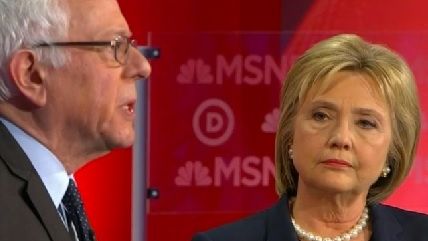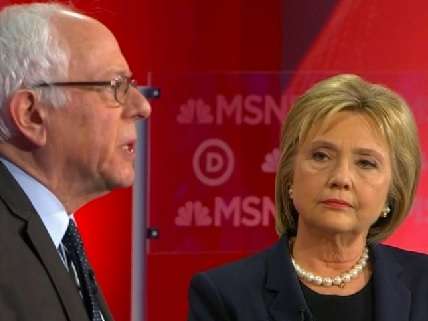Maybe This Time the Democrats Will Talk About Foreign Policy at the Debate
There were no foreign policy questions at the last debate


Hillary Clinton and Bernie Sanders are meeting for their eighth debate tonight, in Miami. Sanders' surprise win in Michigan yesterday kept Clinton from trying to close the door on Sanders in the nomination race.
The last debate did not include any discussion of foreign policy, illustrative of the narrow differences between all of the remaining candidates in the race on both sides. Last month, Sanders finally targeted Clinton's interventionist policies aggressively at a debate, calling her out for being proud of her association with former Richard Nixon and Gerald Ford Secretary of State Henry Kissinger.
He also brought up the U.S.-backed coup against Iranian Prime Minister Mohammed Mosaddegh in 1953 that returned the Shah to power and led, eventually, to the 1979 Islamic revolution that ushered in the Islamic Republic of Iran that has since then been a primary nemesis in the American foreign policy menagerie.
Yet such an understanding of the far-reaching effects of short-sighted interventionists didn't temper Sanders elsewhere—he endorsed an increase in NATO troop levels near Russia's European border as a response to Russian activity in Crimea and Ukraine, and insisted an "aggressive" stance about Iran's support of international terrorism would be critical to normalizing relations with the country.
When it comes to ISIS, the policies articulated by Sanders don't differ much from Clinton or, for that matter, most of the Republican field. At the last debate where foreign policy was mentioned, Sanders called the U.S.-led campaign against ISIS a "war for the soul of Islam" that had to be fought by Muslim soldiers with American support.
As for Clinton, she has said she wants to continue Obama's progress on ISIS. The Obama administration's strategy in ISIS has been similar to the vague policies proposed by Sanders and many of the Republicans—U.S. support for an Arab/Muslim coalition on the ground. The biggest difference between the candidates on ISIS is their rhetoric. Ted Cruz talked about finding out if sand glows. Donald Trump says he wants to kill the families of suspected terrorists. But all the candidates agree in principle that the U.S.-led campaign against ISIS should continue, with American bombings and Arab troops on the ground.
Clinton goes one further, using the pretext of ISIS to impose more government controls on the Internet, which she claims is "the most effective recruiter in the world." (Actually the Internet is simply a communication tool—recruiters use it, like billions of other people, to communicate, but the Internet can no more recruit someone to ISIS than Hillary Clinton's private email server could wipe itself). "You are going to hear all the familiar complaints," Clinton said last December, like "freedom of speech."
The comments were strikingly similar to ones made by Donald Trump. "We're losing a lot of people because of the internet. We have to see Bill Gates and a lot of different people that really understand what's happening. We have to talk to them about, maybe in certain areas, closing that internet up in some ways," Trump said. "Somebody will say, 'Oh freedom of speech, freedom of speech.' These are foolish people."
Clinton hasn't been asked at a debate since then about her Internet comments, or how they mirror the Republican frontrunners. If tonight's debate moderators decide to cover foreign policy, exploring Clinton's comments, and finding out what Sanders' position is on imposing controls on the Internet in the name of the war on terror could actually yield new information about their stated policy positions.
Instead, Democrats are lobbying the moderators to ask more questions about abortion, despite Clinton and Sanders both being pro-choice and pro-spending taxpayer money on reproductive health products and services.


Show Comments (68)